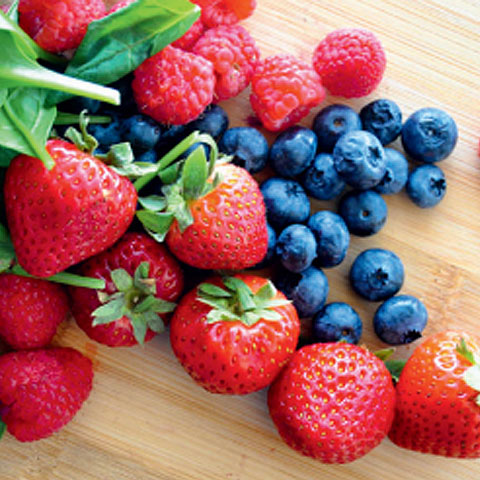Therapy Corner: Food for Thought—Enhancing Neuroplasticity and Neurorecovery through Nutrition

Often discussed is the concept of brain foods, superfoods, and foods that promote brain health, especially after brain injury
By Arielle Resnick, PT, DPT
Advanced Clinical Specialist, Inpatient Brain Injury Unit
Kessler Institute for Rehabilitation
The trillions of bacteria that make up the “gut microbiome” do a lot more than help our bodies digest food. These bacteria promote healing, produce vitamins, and fight inflammation. There is growing interest in how the gut microbiome can be influenced by dietary choices.
Reducing inflammation in the body is especially important after a brain injury. Fruits like pineapple, strawberries, blueberries, oranges, and cherries as well as leafy greens like spinach, kale, and collards all help fight inflammation. Foods high in omega-3 fatty acids have been shown to improve cognition, increase neuroplasticity, and decrease risk of depression. Fatty fishes, flax seeds, walnuts, avocado, and chia seeds are all recommended sources.
Often discussed is the concept of brain foods, superfoods, and foods that promote brain health. The Mediterranean diet is a great example of a diet that is rich in antioxidants and healthy fats. This diet recommends consuming cold-pressed olive oil, vegetables (especially leafy greens), fruits, and whole grains during every meal. It also helps reduce free radicals, which can build up in cells and cause damage to other molecules, such as DNA, lipids, and protein; and enhances cognition and neurogenesis, the growth and development of nervous tissue.
Assisting Patients with Choices
Meanwhile, because traumatic brain injury (TBI) can trigger significant metabolic shifts, individuals with moderate-to-severe TBI may experience difficulty swallowing, condition called dysphagia and a subsequent inability to consume adequate nutrition by mouth.
To increase awareness of nutritional options and assist patients starting their journey back to health, the Food for Thought Initiative was born at Kessler Institute for Rehabilitation. It combines one-on-one education from a registered dietitian along with the ability to order two different options of brain-healthy smoothies each day. The Green Goodness Smoothie, made with anti-inflammatory pineapple, hydrating cucumber, spinach, turmeric, and lemon juice, is available daily at lunchtime. The Berry Blast Smoothie is available daily for an afternoon snack made with Greek yogurt, antioxidant packed frozen berries, and flaxseed oil. As an additional option for patients unable to eat by mouth, a tube-feeding formula is available. It is plant-based, gluten-free, kosher, vegan, organic and non-GMO.
The final—and most exciting—component of this initiative involves participation in an occupational therapy and dietary co-led group. This group empowers patients to make their own brain-healthy smoothies while learning how each ingredient contributes to their well-being. Smoothies are an excellent choice, as the consistency can be easily modified for patients with dysphagia who require varying thicknesses. They can also be created and consumed within a 45-minute group session. These sessions are currently up and running at the Kessler Institute’s Chester campus and are coming soon to the Saddle Brook and West Orange, N.J., campuses.
Stay tuned for future offerings from this important initiative!
